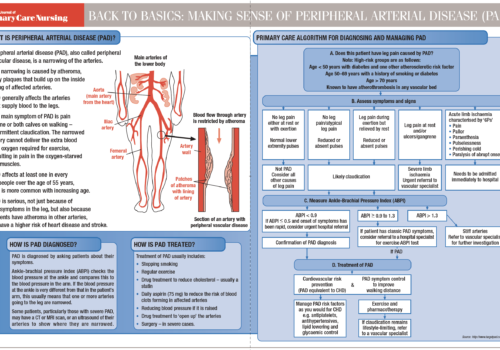Around one-third of patients with peripheral arterial disease (PAD) fail to receive appropriate antiplatelet treatment, warns a review from an expert panel, which highlights the huge cost of sub-optimal treatment of PAD on the NHS, the economy as a whole and on the individuals affected.
Early indications of best practice in reducing the inequalities in vascular health in England
Cardiovascular disease and type 2 diabetes
C-reactive protein as a marker of cardiovascular risk. Chicken, egg or turkey?
Improving patient adherence to prescribed medication for cholesterol management
Implementing the NICE guideline for secondary prevention of MI
High blood pressure: only one number matters for patients over 50
Review calls for greater effort to diagnose and treat peripheral arterial disease
Statin therapy for secondary prevention of coronary heart disease: an update (part 3)
Starting on a Gliptin – Sitagliptin or Vildagliptin
Heart Failure Specialist Nurses: Feeling the Impact
Heart Failure Specialist Nurses (HFSNs) now work in the community alongside their general practice colleagues. They can act as a valuable resource to support the primary care team in the management of heart failure patients. They carry out home visits and run community clinics to stabilise patients after discharge from hospital following an acute event. The aim is to educate patients and their family carers how to manage living with heart failure, up-titrate medications to optimal levels, stabilise the patient and then hand them back to the care of the primary care team, knowing that they will be referred back to the HFSN should their condition deteriorate. However, some complex patients with advanced heart failure (NYHA III or IV) and at high risk of re-hospitalisation are retained in the specialist nurse caseload.





















